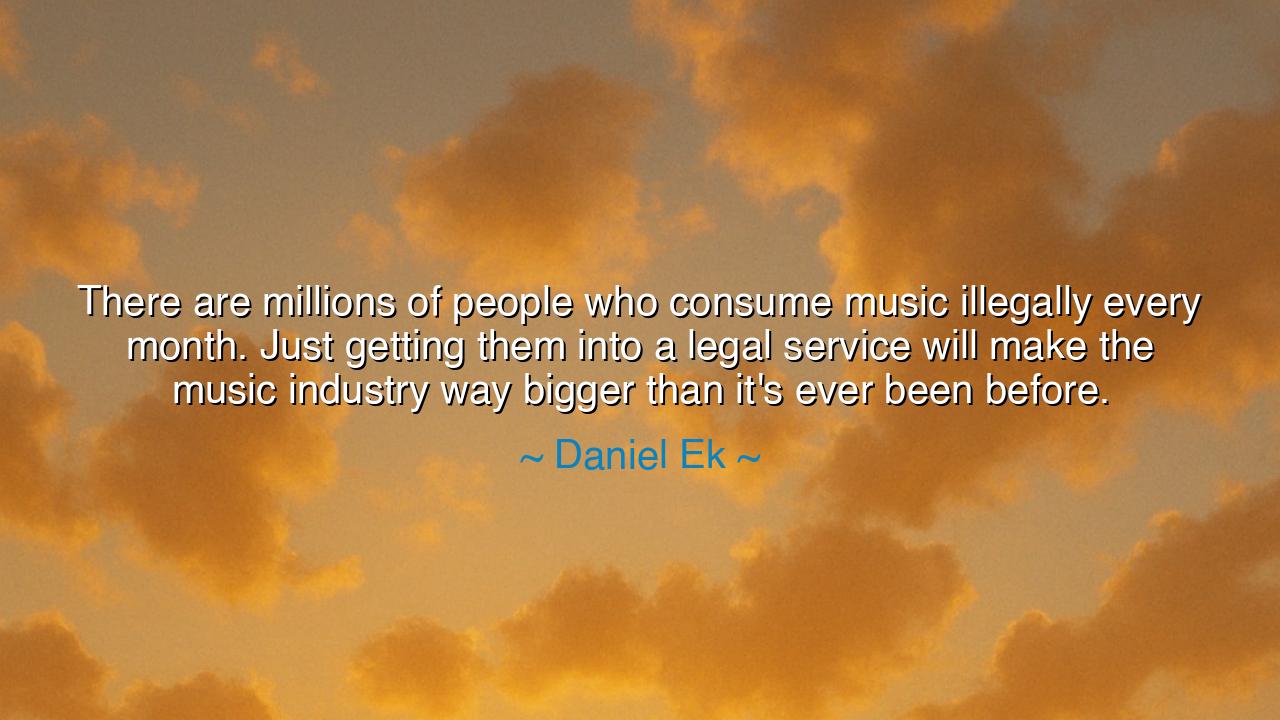
There are millions of people who consume music illegally every
There are millions of people who consume music illegally every month. Just getting them into a legal service will make the music industry way bigger than it's ever been before.






The words of Daniel Ek, architect of Spotify and visionary of the digital age, strike with both clarity and hope: “There are millions of people who consume music illegally every month. Just getting them into a legal service will make the music industry way bigger than it’s ever been before.” In these lines, he unveils a truth not only about music, but about human nature and the structures of society. He does not condemn the listener who seeks music through unlawful means, but rather sees within that act a hunger—an undeniable demand. His vision is that by transforming that hunger into a lawful channel, both art and industry may flourish beyond measure.
At the heart of his saying lies the recognition that demand is not the enemy; it is the raw energy that must be guided. Millions were already listening, already yearning for music in their daily lives. The problem was not love of art, but the absence of systems that honored both the creators and the listeners. Ek saw that if those millions could be gathered into the shelter of legal services, where music flowed freely yet fairly, then the industry would rise not by fighting its people but by embracing them. His words remind us that sometimes growth does not come by suppressing behavior, but by transforming it.
History gives us a mirror of this wisdom. Consider the days of the printing press. When books were scarce, scribes and monks guarded manuscripts like treasure. Yet when Gutenberg’s press spread knowledge to the masses, many feared it would destroy the sanctity of literature. Instead, by making books accessible, the love of learning exploded across Europe, giving rise to the Reformation, the Enlightenment, and the modern world. So too with music: what once was seen as theft, when redirected into lawful abundance, becomes the very fuel of industry and cultural renewal.
Ek’s words also pierce into the struggle between law and accessibility. The music industry for decades fought piracy with lawsuits, penalties, and fear. But the people, desiring song, found ways regardless. It was not punishment that solved the crisis, but innovation—services that gave listeners convenience, affordability, and abundance, while ensuring artists could be honored. By recognizing this, Ek’s vision turned conflict into collaboration, proving that when systems align with human behavior, prosperity multiplies.
And yet, there is a warning hidden within his insight: law without adaptation becomes brittle. Industries and nations alike must learn that to resist change is to risk irrelevance. The lesson is not only for music but for all human endeavors—whether education, technology, or commerce. If people hunger for access, the wise leader asks, “How can we provide this lawfully and fairly?” rather than, “How can we stop them?” For history has shown that attempts to halt human desire often fail, but efforts to channel it can change the world.
The meaning, then, is profound: the future belongs to those who see opportunity within disruption. Millions who once took music illegally were not enemies, but potential allies. By giving them a path that honored both art and accessibility, Ek saw the possibility of making the music industry “way bigger than it’s ever been before.” His words remind us that growth comes not only from invention but from reimagining what already exists, from seeing the potential hidden even in chaos.
Therefore, children of tomorrow, take this lesson to heart: when you encounter struggle, do not only condemn, but seek to understand the desire beneath it. Build systems that uplift rather than punish, that transform hunger into harmony. In your own life, when faced with challenge, ask how to turn resistance into renewal, chaos into order, loss into gain. For just as music found new life when it embraced its listeners, so too can every endeavor flourish when it learns to work with the deepest needs of humanity, rather than against them.






AAdministratorAdministrator
Welcome, honored guests. Please leave a comment, we will respond soon